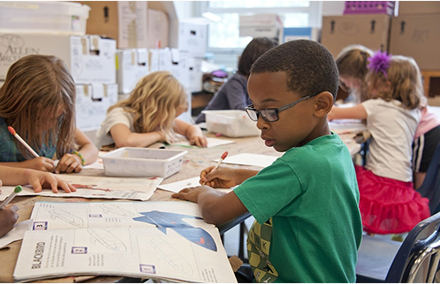Zoom Session 9/20/22
Thank you to Nok Nora Duany Bassey and Katherine Holloway for leading the training and writing this valuable recap document. Thank you to Maria Morukian, Lauren McClurg, Renzo Reyes and Melinda Carlson-Scott for your leadership and participation in this training.
Do you want to be an inclusive parent at Lafayette? Read on!
Authors’ Note: Thanks to the 100+ parents who attended the DEI identity training on Tuesday, September 20! We were encouraged by the turnout and regret that some of you were unable to join after the meeting hit the maximum number of Zoom participants. Due to the sensitive nature of personal experiences shared during the training, the session was not recorded.
The training touched on inclusivity primarily as it pertains to race and mobility and physical disabilities. Access is a related important topic, as is thinking about inclusivity as it pertains to the broader category of disabilities in our community, including Lafayette students and family members with hearing, visual, and cognitive or learning disabilities.
We are happy to share the actionable takeaways from the training. If you want to practice inclusive parenting at Lafayette, the key is being intentional and proactive.
What can we as parents do to make Lafayette more inclusive from a race perspective?
Start by reflecting on your values. We are sending messages about race to our children whether we’re talking about it or not. They are watching what we do. More importantly, they are watching what we don’t do. As Robin DiAngelo writes, the practice of our lives is more powerful than the words we say. What message do you want to convey to your children about race? Consciously decide and align your intentions with your actions.
Here are three ways to align inclusive intentions with your actions:
- Be conscious when you’re making invitations – to playdates, birthday parties, and extracurricular activities including sports teams. Step off of auto-pilot when organizing social events. We as parents have tremendous influence over the extent to which a given child at Lafayette feels welcome, as we make choices every day regarding invitations. Be the parent who makes sure there is not a child in the class who is consistently not invited to activities outside of school.
When you are going to a school event like a parent potluck or outdoor movie night, ask a new person “Want to go together?” or “I booked a babysitter. Would your child like to have a playdate with mine while we go to the potluck together?” When you are at a class playdate or a parent potluck, look out for anyone who is standing alone and go talk with that person. Especially if you are the host or a room parent, ensure every parent feels welcome both prior to and during the event.
-
- Use Ms. Diesner’s Language Cheat Sheet to help with translations. It is important to be mindful of language when planning social events and making invitations.
- This article in Parents highlights the importance of opting for inclusive extracurriculars, helping expand your kid’s social circle and focusing on your own social circle.
- Greet someone new at pickup, drop-off or any school event. Learn a new person’s name. Join the Lafayette Hello Greeter Program! Make every student and parent/guardian at our school feel welcome.
-
- When you greet someone new, lean into similarities! Focus on common ground: the children, how the children are adjusting to this school year and favorite activities of the children. There is so much to unpack there!
- Avoid asking “Where do you live?” Families have reported that this question may be isolating. The question to ask yourself before you ask that question is “Why am I asking this question to a person of color?”
- If the opportunity arises, take the chance to make new families aware of the A-to-Z Directory, and make sure they understand that this is one of the keys to making sure their child is included socially.
- Talk to your children about race. Wondering where to start?
The HSA is organizing programming that will help foster conversations about race. Join the HSA for one or more of the following activities.
-
- Saturday, October 1- Sign up for a family trip to the National Museum of African American History Culture. Come out, learn at the museum, and connect with families.
- Thursday, October 13- DEI Media Club spearheaded by Brittany Bolston. All parents are welcome! The first meeting will be a discussion of the podcast Scene on Radio– Season 2: Seeing White Episode 1&2. Join using this link.
- Tuesday, November 15 at 7 PM- HSA General Meeting #2 Join Ms. Ryden and Ms. McArthur to learn about the history of the Lafayette land and Lafayette-Pointer Park as well as our Black Lives Matter Year of Purpose which was created by Lafayette’s Racial Equity Committee. Join using this link.
- In February, look out for a program for families to watch the movie Ruby Bridges and follow up with an adult conversation over wine to discuss it.
Reading books with your child is a key way to start and continue to have conversations about race and ethnicity. Here are some resources with suggested books:
Here are resources to support conversations about race with your children.
What can we as parents do to make Lafayette more inclusive from a mobility and physical disability perspective?
- When planning events, ensure all registration and sign-up forms are accessible and include questions about any needed accommodations so people can fully participate.
- Ensure the space for the event is physically accessible. For instance, keep the spaces organized/laid out in such a way so as to ensure people with mobility disabilities can easily navigate the area, allowing everyone to access different activities. Also, consider students with disabilities in both the physical layout of the event and in the activities that are incorporated. For example, some students have limited fine motor skills/strength so we want to ensure we include activities that do not necessarily involve lifting, throwing, etc., but still have options for those students to participate alongside their peers.
- Language matters. Make an effort to include inclusive language in events, such as we did when we recently changed the annual Walk to School Day to Walk/Roll to School Day. You can replace words like “run” with “race” to be inclusive of people who use wheelchairs or other walking aids. Avoid using words like “inspirational” or “courageous” when talking to kids with disabilities. When talking to your nondisabled children about their classmates with disabilities, remember that our kids want what most everyone wants — to be treated with kindness, and to be treated like everyone else.
As the pandemic hopefully subsides, this is the perfect moment to decide more consciously who we include and invite. We hope you will join us on this journey to elevate our focus on belonging. Together we can do this!






